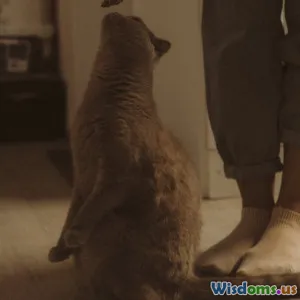
Debunking Common Misconceptions About Senior Pet Care
7 min read Uncover the truth behind common myths about senior pet care to improve your aging pet's quality of life. (0 Reviews)
Debunking Common Misconceptions About Senior Pet Care
As pets enter their golden years, caring for their health and happiness becomes increasingly important. However, many pet owners hold misconceptions about what it means to care for a senior pet—beliefs that can impact how we approach their needs. In this article, we’ll dismantle the most common myths surrounding senior pet care and provide actionable insights to help your aging companion thrive.
Myth 1: Older Pets Don’t Need Regular Vet Visits
Reality: Routine veterinary care is crucial regardless of age, and arguably more important for senior pets. The American Veterinary Medical Association (AVMA) stresses that early detection of diseases common in older pets—arthritis, kidney disease, dental issues, and cancer—can significantly improve quality and length of life.
Example: Consider Bella, a 12-year-old Golden Retriever whose arthritis was misdiagnosed by her owner as “just old age lethargy.” A vet visit revealed early-stage joint disease, and with appropriate medications and physical therapy, Bella regained mobility and vigor.
Regular check-ups also allow vaccinations to be updated and enable vets to adjust diets or medications where needed.
Myth 2: Senior Pets Should Eat Less Because They Are Less Active
Reality: While some senior pets reduce activity levels, their nutritional needs actually become more specialized rather than simply less.
Pets age differently, and their metabolism can change. Nutritionists often recommend diets lower in calories but higher in fiber, antioxidants, and joint-support nutrients like omega-3 fatty acids and glucosamine.
Real World Insight: A study published in the Journal of Nutrition found that diets enriched with antioxidants improved cognitive functions in senior dogs, demonstrating that quality of nutrition can influence brain health.
Feeding less without consulting vets can lead to malnutrition or muscle wasting, impacting mobility and immunity.
Myth 3: Aging Pets Are Inevitably Lonely and Depressed
Reality: Just like humans, senior pets benefit from mental stimulation, social interaction, and adequate physical activity.
Owner-associated loneliness is a strong predictor of decreased wellbeing; yet, many assume older animals are content to rest and avoid engagement.
Example: A 2018 study involving senior cats at an animal shelter revealed that interactive play sessions and environmental enrichment significantly improved activity levels and reduced stress markers.
In-home enrichment such as puzzle feeders, regular walks, interactive toys, and gentle play can spark joy and cognitive vitality.
Myth 4: Senior Pets Don’t Adapt Well to New Routines or Environments
Reality: With gentle introductions and patience, older pets are often capable of adjusting well to changes.
Owners sometimes avoid exhilarating experiences or moves, fearing stress on their senior companions. Though gradual transitions are necessary, assuming they cannot adapt might lead to under-stimulation.
Anecdotally, there are numerous cases of elderly pets successfully integrating into new homes or embracing new routines when approached calmly—for instance, senior dogs thriving after adoption as late as 10 years of age.
Myth 5: Pain Management in Senior Pets Is Optional or Ineffective
Reality: Pain is not a normal part of aging, and managing it is paramount to maintaining your pet’s quality of life.
Orthopedic conditions like arthritis are prevalent among seniors but often go undiagnosed or untreated. Pain can manifest subtly, such as reduced appetite, irritability, or altered grooming habits.
Expert Insight: The American Association of Feline Practitioners highlights that pain assessment in cats using scales and behavioral cues is essential, as they often hide discomfort.
Veterinarians have a wide arsenal of safe pain-relief options, from non-steroidal anti-inflammatory drugs (NSAIDs) to physical therapy and acupuncture.
Practical Strategies for Effective Senior Pet Care
Aside from debunking myths, implementing certain strategies can promote a thriving senior pet life:
-
Customized Diet Plans: Work with your vet to tailor diets to your pet’s changing metabolism and health concerns.
-
Regular Exercise: Adapt activities to their capability but encourage movement to maintain muscle tone and cardiovascular function.
-
Environmental Comfort: Provide warm bedding, slip-resistant floors, and easy access to favorite spots.
-
Mental Enrichment: Use scent games, puzzle toys, and gentle training sessions.
-
Health Monitoring: Keep track of behavioral changes, grooming, appetite, and bathroom habits to catch issues early.
-
Dental Care: Older pets are prone to periodontal disease; professional cleanings and at-home brushing matter.
Conclusion
Senior pet care is a dynamic and nuanced journey that requires dispelling outdated myths to provide truly compassionate and effective care. Older pets deserve the same proactive medical attention, emotional engagement, and quality nutrition as their younger counterparts. By addressing misconceptions head-on—whether about medical visits, diet, mental health, adaptability, or pain management—pet owners can significantly enrich the lives of their aging companions.
After all, longevity isn’t just about adding years; it’s about adding life to those years.
“Caring for an aging pet isn’t about slowing down; it’s about tuning in and adjusting our love and care to their new needs.” — Dr. Emily Martinez, Veterinarian
Embrace the wisdom of informed senior pet care and watch your cherished friend blossom even in later years.
References:
- American Veterinary Medical Association (AVMA): Healthy Aging for Pets
- Journal of Nutrition: Antioxidants and Cognitive Health in Dogs, 2020
- American Association of Feline Practitioners: Feline Pain Management Guidelines, 2021
- Grace, A. (2018). Enrichment for Senior Cats and Dogs. Shelter Medicine Journal.
Rate the Post
User Reviews
Popular Posts




















